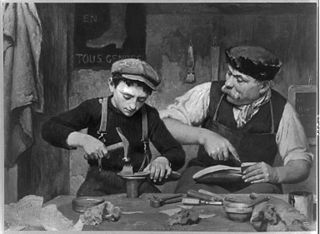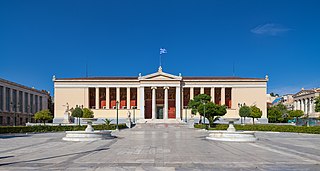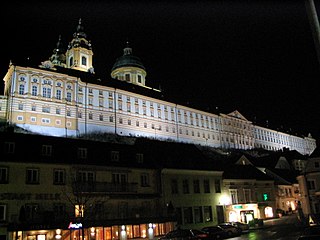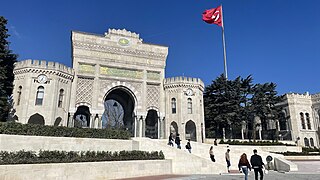
A college is an educational institution or a constituent part of one. A college may be a degree-awarding tertiary educational institution, a part of a collegiate or federal university, an institution offering vocational education, a further education institution, or a secondary school.

Vocational education is education that prepares people for a skilled craft as an artisan, trade as a tradesperson, or work as a technician. Vocational education can also be seen as that type of education given to an individual to prepare that individual to be gainfully employed or self employed with requisite skill. Vocational education is known by a variety of names, depending on the country concerned, including career and technical education, or acronyms such as TVET and TAFE.

Apprenticeship is a system for training a new generation of practitioners of a trade or profession with on-the-job training and often some accompanying study. Apprenticeships can also enable practitioners to gain a license to practice in a regulated occupation. Most of their training is done while working for an employer who helps the apprentices learn their trade or profession, in exchange for their continued labor for an agreed period after they have achieved measurable competencies.

Gymnasium is a term in various European languages for a secondary school that prepares students for higher education at a university. It is comparable to the US English term preparatory high school or the British term grammar school. Before the 20th century, the gymnasium system was a widespread feature of educational systems throughout many European countries.

Matura or its translated terms is a Latin name for the secondary school exit exam or "maturity diploma" in various European countries, including Albania, Austria, Bosnia and Herzegovina, Bulgaria, Croatia, Czech Republic, Hungary, Italy, Kosovo, Liechtenstein, Montenegro, North Macedonia, Poland, Serbia, Slovakia, Slovenia, Switzerland and Ukraine.

Education in Greece is centralized and governed by the Ministry of Education, Religious Affairs, and Sports at all grade levels in elementary, middle school, and high school. The Ministry exercises control over public schools, formulates and implements legislation, administers the budget, coordinates national level university entrance examinations, sets up the national curriculum, appoints public school teaching staff, and coordinates other services.
The lyceum is a category of educational institution defined within the education system of many countries, mainly in Europe. The definition varies among countries; usually it is a type of secondary school. Basic science and some introduction to specific professions are generally taught.

A vocational school, trade school, or technical school is a type of educational institution, which, depending on the country, may refer to either secondary or post-secondary education designed to provide vocational education or technical skills required to complete the tasks of a particular and specific job. In the case of secondary education, these schools differ from academic high schools which usually prepare students who aim to pursue tertiary education, rather than enter directly into the workforce. With regard to post-secondary education, vocational schools are traditionally distinguished from four-year colleges by their focus on job-specific training to students who are typically bound for one of the skilled trades, rather than providing academic training for students pursuing careers in a professional discipline. While many schools have largely adhered to this convention, the purely vocational focus of other trade schools began to shift in the 1990s "toward a broader preparation that develops the academic" as well as the technical skills of their students.

The Republic of Austria has a free and public school system, and nine years of education are mandatory. Schools offer a series of vocational-technical and university preparatory tracks involving one to four additional years of education beyond the minimum mandatory level. The legal basis for primary and secondary education in Austria is the School Act of 1962. The Federal Ministry of Education is responsible for funding and supervising primary, secondary, and, since 2000, also tertiary education. Primary and secondary education is administered on the state level by the authorities of the respective states.

Education in Poland is compulsory; every child must receive education from when they are 6 years old until they are 18 years old. It is also mandatory for 6-year-old children to receive one year of kindergarten education, before starting primary school at 6 years old. Primary school lasts eight years, and students must take a final exam at the end of the eighth grade. After graduating from primary school, people typically go on to attend secondary school, which lasts 4 or 5 years. They can also choose to educate themselves towards a specific profession or trade, and receive work experience and qualifications through apprenticeships. After graduating from secondary school and passing the final exam, called the matura, one can pursue a higher education at a university, college, etc.

The educational system in Hungary is predominantly public, run by the Ministry of Human Resources. Preschool kindergarten education is compulsory and provided for all children between three and six years old, after which school attendance is also compulsory until age of sixteen. Primary education usually lasts for eight years. Secondary education includes three traditional types of schools focused on different academic levels: the Gymnasium enrols the most gifted children and prepares students for university studies; the secondary vocational schools for intermediate students lasts four years and the technical school prepares pupils for vocational education and the world of work. The system is partly flexible and bridges exist, graduates from a vocational school can achieve a two years program to have access to vocational higher education for instance. The Trends in International Mathematics and Science Study (TIMSS) rated 13–14-year-old pupils in Hungary among the best in the world for maths and science.

Education in Turkey is governed by a national system which was established in accordance with the Atatürk's Reforms. It is a state-supervised system designed to produce a skillful professional class for the social and economic institutes of the nation.

A general education liceum is an academic high school in the Polish educational system. They are attended by those who plan to further their academic education upon graduation from szkoła podstawowa through a path other than Technikum or Vocational school.

Engineering education is the activity of teaching knowledge and principles to the professional practice of engineering. It includes an initial education, and any advanced education and specializations that follow. Engineering education is typically accompanied by additional postgraduate examinations and supervised training as the requirements for a professional engineering license. The length of education, and training to qualify as a basic professional engineer, is typically five years, with 15–20 years for an engineer who takes responsibility for major projects.

A Höhere Technische Lehranstalt, commonly known as HTL, is an engineering-focused high school/institution of further education in Austria. As an umbrella term it is used for either
In South Africa, matriculation is the final year of high school and the qualification received on graduating from high school, and the minimum university entrance requirements. The first formal examination was conducted in South Africa under the University of the Cape of Good Hope in 1858. In general usage, the school-leaving exams, which are government-administered, are known as the "matric exams"; by extension, students in the final year of high school are known as "matriculants" or, more commonly, "matrics". Once the Matric year has been passed, students are said to have "matriculated".
The system of education in Iceland is divided in four levels: playschool, compulsory, upper secondary and higher, and is similar to that of other Nordic countries. Education is mandatory for children aged 6–16. Most institutions are funded by the state; there are very few private schools in the country. Iceland is a country with gymnasia.
|country name = Croatia |agency image = |agency = Ministry of Science and Education |leader titles = Minister of Science and Education |leader names = Radovan Fuchs |budget = HRK 13.091 billion |budget year = 1999 |primary languages = Croatian |system type = National |established events = |established dates = |literacy year = |literacy total = 99.7% |literacy men = 99.9% |literacy women = 99.5% |enroll total = |enroll primary = |enroll secondary = |enroll post-secondary = |attain secondary = |attain post-secondary = |footnotes = }}

The Constitution of North Macedonia mandates free and compulsory primary and secondary education in the Republic of North Macedonia, and the Law on Primary Education specifies that all children from 6 to 15 years of age attend school for a compulsory 9 years. The Law on High School Education specifies that all adolescents from the ages of 15–19 must attend high school for 4 years.














